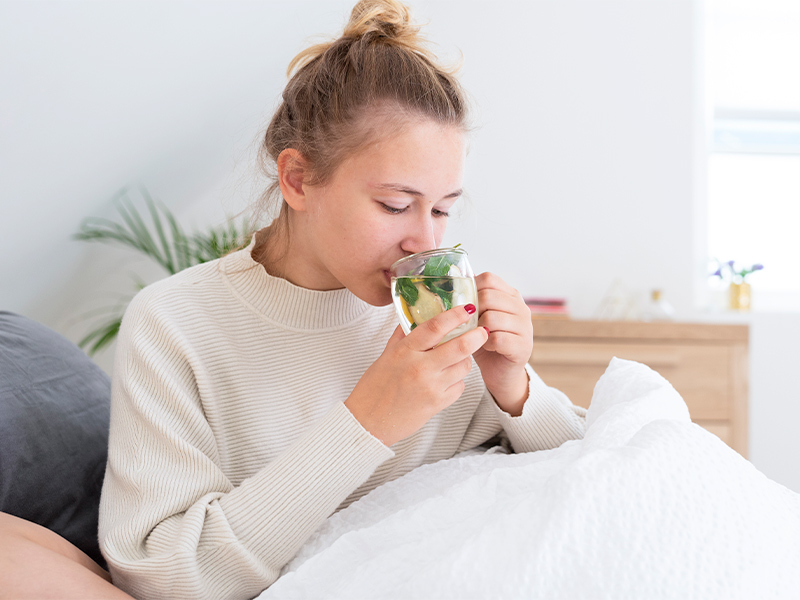Sleepless nights? These natural herbs may help you get the rest you need
Find yourself tossing and turning all night? Or perhaps you often wake up feeling unrefreshed? These natural herbs may help you get the sleep you need.
It’s commonly known that a good night’s rest is vital for good health, but almost half of adult Australians report inadequate sleep and sleep-related problems during the day.
Herbal remedies have been used through the ages to aid sleep – a cup of chamomile tea, for example, is highly touted for having a calming effect>.
But how do herbs work, and which ones are the best?
So, how do herbs support sleep?
Naturopath and nutritionist Katherine Maslen says herbal medicines have a “unique phytochemical profile,” and can support sleep in various ways.
“Sedative herbs – such as chamomile, passionflower and lemon balm – are calming, whereas hypnotic herbs – California poppy, hops and valerian – are stronger, and are used to initiate sleep,” Katherine says.
“You may also choose herbs that are anxiolytic to calm anxiety, or those that work on the stress response.”
She says herbs work best in combination, rather than in isolation, as the effects are amplified but don’t always work the same for everyone.
“You need to look to the root cause of the issue – often stress, excessive caffeine or poor sleep hygiene – to truly correct the issue,” she adds.
- Telltale signs: How to know it’s time to ditch your old mattress
Essential herbs for better sleep
Ashwagandha
Otherwise known as Indian ginseng or winter cherry, this herb is commonly used in Ayurveda medicine for its anxiolytic effect.
One study found a component of the plant’s leaves, triethylene glycol, can be sleep-inducing.
In another study, older adults who took the herb daily over 12 weeks improved both their sleep quality and mental alertness on waking.
Ashwagandha can be taken as a powder, capsule or liquid extract and while it’s considered safe for most people, experts say more research is needed.
Chamomile
The high achiever of the herb world, this daisy-like flower is hailed as a sleep superhero.
One of the oldest medicinal plants, chamomile is most popular in teas and essential oils, with more than a million cups of chamomile tea consumed daily.
One clinical trial found it significantly improved sleep quality in those who took 200mg of chamomile extract twice daily for 28 days.
“A cup of strong chamomile tea can have a big impact on sleep,” Katherine says.
She suggests having two cups – let them cool slightly and drink 30 minutes before bed.
Ginseng
A gnarled root commonly used in Chinese medicine, ginseng can be consumed raw or steamed, and in extract, capsule or powder form.
Katherine says there are studies that suggest ginseng can be helpful when it comes to sleep, but it pays to be careful about the type of ginseng you use as some act as stimulants.
An extract of red ginseng root has been found to improve sleep quality in adults.
Lavender
You may not immediately think “herb”, but this purple garden staple is a firm favourite with insomniacs.
Several studies suggest it may be helpful as both an anxiolytic and a sedative herbal remedy.
Crush fresh flower heads and pop them under your pillow, drop them into a cup of bedtime tea, or use lavender essential oil in aromatherapy for some serious shut-eye.
Lemon balm
This lemon-scented plant is a member of the mint family and often paired with other calming herbs to aid sleep.
Research has shown when brewed with valerian, lemon balm may help relieve insomnia.
Dried lemon balm can be taken as capsules, or steeped in hot water for a nighttime drink.
- Night fright: Sleep paralysis explained
Passionflower
The flower that turns into a passionfruit on the vine is not only pretty, but it may also help foster a deeper sleep.
“I recommend it in supplement form or as a tea before bed,” Perth-based naturopath Natalie McGrath says.
“It’s one of the herbs that helps with sleep neurobiology while countering hyper-arousal in regions of the brain that may interfere with sleep.”
A 2013 study found passionflower was effective for insomnia when used with valerian and hops.
Valerian root
With its use as a medicinal herb dating back to Ancient Greeks and Romans, valerian root is a mainstay on the sleep scene and may help you fall asleep faster – and stay asleep for longer.
It’s typically taken as a tablet or capsule, or in a tea bag.
Note: Not all herbs are appropriate for everyone, so it’s important to speak with a healthcare professional before you add any to your bedtime routine. If you have trouble sleeping, see your doctor to discuss the best way to treat your specific issue.
Written by Elissa Doherty.






